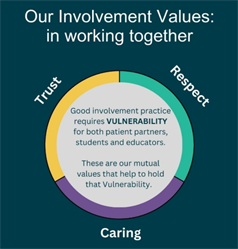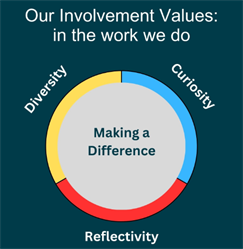View all Close all
Our Patient Partners Community (PPC) is a co-created group of over 150 patients, carers and community members who are involved in medical education at City St George's. Patients, carers and community members are half the story when training the doctors of tomorrow. We work collaboratively with the PPC members to create rich and transformative learning experiences; such as simulated patient exam stations, clinical and communication skills sessions and sharing lived experiences.
The Community also has social events, peer learning events and we provide training and support relevant to all involvement activities.
To find out more or apply to get involved please see 'How can I get involved?' below
We met with members of the PPC to identify what values are important in our involvement activities. Members recognised that all involvement requires vulnerability and that values of mutual trust, respect and caring were necessary to hold the vulnerability that students, patient partners or educators may experience.
We also discovered core values in how, as a community, we look out into the world in the work we do together. The collective motivation for being involved in medical education was to 'make a difference'. Members identified the need for reflectively, curiousity and diversity to achieve that aim.


'I gave them opportunity to learn. I'm passionate because I will need them one day. There will be a day I will meet them. You see, they will learn and they will come back and take care of me'
'I love it. I really LOVE it. Sometimes the students, you can see they are nervous and sometimes you can't say anything to help. But I will them. I will them to do well. And some of them are amazing you know?'
'I just wanted to give back. [City] St. George's has helped me a lot over the years and this is my way to give back. Also, if I don't have anything on, then why not? There's also quite a few of us when we come for exams. You get lunch and coffee and the group is really diverse. I think that's really good'
'I think we have a lot to offer. To share with them what it's really like - what I deal with every day. And I can see them listening. REALLY listening. It feels like I'm really making a difference'
'I wanted to send a brief email to say thank you very much for arranging the community visit today. It was a wonderful session that provided a real insight into the human counterpart to the clinical science (which is easy to become wholly focused on). Hearing our participant's personal experiences was a real reminder that, despite a shared condition, each person's management, struggles and emotions are unique to them'
'I am really hopeful that this experience will be a springboard for us students to help change perceptions within healthcare and the wider community'
'The opportunity to ask a variety of questions regarding patient's experiences with sickle cell disease. All of the speakers were really inspiring and they had a variety of experiences with the healthcare system, not just in the UK but also around the world'
'It's good working with actors too, but you can always tell. There's something about being able to see real patients before we are out on placement'
Clinical exams
This is a half or a whole day and involves coming to City St George's (Tooting campus) and participating in patient simulation scenarios for student's practical exams. Lunch and refreshments are provided and you will be offered payment for your time (see 'Payment, expenses and recognition' below). People often enjoy the social aspect of meeting other people with similar conditions.
Clinical and Communication Skills teaching sessions
Medical students really value the opportunity to interact with real patients as they develop various skills. Clinical Skills sessions involve students practising various aspects of doing a physical examination. In Communication Skills sessions students practice their history taking and conversation skills and you will have a chance to offer feedback and support to students to help them develop these skills.
Shared lived experiences
Stories are a very powerful way to support learning. There is something about hearing someone's story that we can connect with on a more personal level. Throughout the curriculum, we have patients, carers and community members who come in and join teaching sessions to share their lived experiences. We offer support and training around sharing your experiences so if you are not confident or unsure, please do still get in touch. Often patients can find it really helpful to share what are sometimes difficult experiences and in doing so, create something really positive with that, which will help change healthcare culture and make things better for others.
Committees and Governance
We are looking to develop more patient representation at governance level. This may include attending virtual or in-person meetings. It is important that the people we involve at decision-making level are not only those who have experience of being in governance committees. We need to hear a diverse range of views and we are proud of the long-term relationships we build with the patients, carers and community members we work with to enable that to happen. Full training and support will be provided.
Community Visits
In the early years of the programme, medical students spend a half day, or a few hours, with various community groups. The community group runs the session and it is a valuable way for students to gain a broader perspective on healthcare. We are always looking to develop our range of community visits so if you are a community organisation and you are interested in working with us, then we warmly encourage you to get in touch. Community visit providers are compensated well for hosting our students.
Valuing people's time is a key consideration throughout all our involvement activities. We have a flexible Payment and Recognition policy and we are able to provide refreshments, travel expenses and payment for more involvement activities. You will always know in advance what will be involved and what remuneration we can offer for each activity.
To get involved you can fill out this short form or email Kirstie Ellis, kellis@sgul.ac.uk.
If you are in any community groups or if you have friends or family who you think would like to get involved in medical education, you are welcome to share this PPC recruitment flyer.